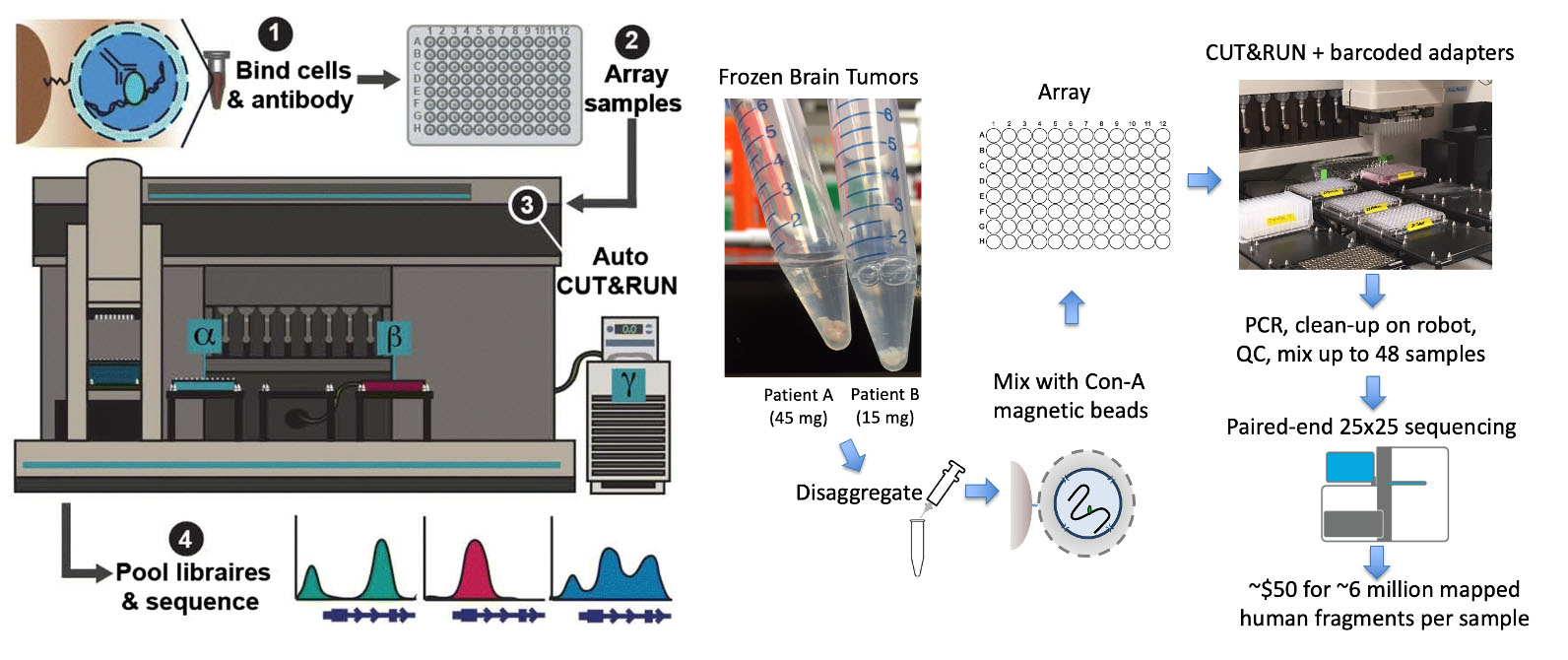Exploring underlying mechanisms of pediatric cancers; seeking less toxic treatments
The Sarthy Lab is exploring the epigenetics of pediatric lymphomas to gain insight into how and why these cancers start, in hopes of ultimately finding better treatments. Led by Dr. Jay Sarthy, this work could shed light on why some cancers are resistant to treatment or come back after treatment. The Sarthy Lab is also examining a chemotherapy drug often used in Asia to treat elderly cancer patients to see if it could become a frontline treatment for pediatric cancers. This drug could have fewer side effects than today’s standard treatments.
Current Projects

Using epigenetic profiling tools to better understand and treat pediatric cancers
One of the Sarthy Lab’s key projects is examining whether epigenetics might play a role in how lymphomas start and why they sometimes evade treatment.
Dr. Sarthy explains epigenetics in these terms: The genome is a book, genes are the words and epigenetics is the spacing between the words. In many adult cancers, the words have typos, helping explain why these cancers happen. In pediatric cancers, the words are almost always spelled correctly, but Dr. Sarthy’s previous work helped identify that the spacing between the words is often way off. This could help explain why these cancers happen and provide a possible target for treatment. The Sarthy Lab is working to understand whether it’s possible to use small molecules to fix the spacing, or to make the spacing worse to destroy cancerous cells.
The Sarthy Lab is also exploring how a specific DNA-binding protein plays a role in lymphomas. This protein, called H2A.B, is normally expressed only in developing sperm cells. The Sarthy Lab identified abnormal expression of this protein in several types of cancer including lymphomas, but not in other healthy cells in the body. They are now trying to understand how this protein alters the DNA of lymphoma cells to cause cancer and identifying new strategies for targeting this protein.
In addition, Dr. Sarthy is examining whether broad epigenetic diversity enables some cancer cells to evade treatment or relapse after treatment. His team is taking samples from people whose cancers have come back and comparing them to their initial cancers. This enables the researchers to examine epigenetic differences between the two. They hypothesize that the sperm protein is driving epigenetic differences and allowing cells to evade therapy. This research will also help answer a larger question of whether epigenetic diversity is the reason that some cancer cells can evade therapy.
What makes the deadliest cancers so difficult to treat?
The Sarthy Lab is also working to understand if specific epigenetic profiles make certain cancers particularly deadly. The research team is examining the epigenome in samples from patients and model organisms with high-risk leukemia, sarcoma and pediatric and adult glioblastoma. The goal is to understand common features and differences that make certain cancers unique or particularly difficult to treat.
Can less toxic chemotherapy drugs effectively treat pediatric cancers?
More children than ever are surviving cancer. But many of them live with long-term side effects of treatment, including heart problems, infertility and secondary cancers. The Sarthy Lab is examining whether a chemotherapy drug called aclarubicin might be effective against pediatric lymphomas and other childhood cancers, with fewer side effects.
This therapy is commonly used in Asia to treat elderly cancer patients. It is often given to people who have heart problems because they are unable to tolerate more toxic chemotherapy drugs. If this therapy proves effective in children, it could be quickly implemented as a new treatment option because it has already been widely used and proven safe in Asia.
Latest News
- September 13, 2024 Healing Without Harm: Reducing Chemo Toxicities
- September 9, 2024 Seattle Children’s and WSU Host Inaugural Joint Research Symposium
- June 20, 2024 Sarthy Lab Technician Carli Newman Selected as Damon Runyon SPARK Scholar
- June 20, 2023 Insights on ‘Conquering’ Chromatin in Childhood Cancers Presented at Seattle Children’s Research Institute
- June 1, 2023 Student Carter Zivin Awarded Pediatric Oncology Research Grant

Jay F Sarthy, MD, PhD
Dr. Sarthy is an attending physician in Seattle Children’s Bone Marrow Transplantation unit. He has also continued his basic biology research at Seattle Children's, focusing on epigenetics of pediatric cancers and identifying less toxic pediatric cancer treatments. In his spare time, Dr. Sarthy enjoys spending time with his family. He also enjoys hiking, skiing, kayaking and listening to classic country music.
Publications
See a complete list of Dr. Jay Sarthy’s publications on PubMed.
